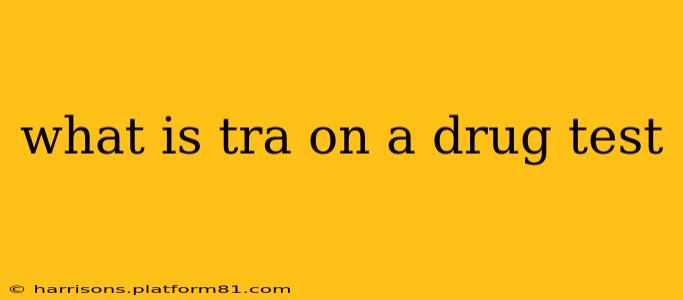Finding "TRA" on your drug test results can be confusing and concerning. This guide will clarify what TRA stands for in this context, how it's detected, and what it might indicate. Understanding your drug test results is crucial, and this explanation aims to provide clear, accurate information.
What does TRA mean on a drug test?
TRA on a drug test usually refers to tramadol, an opioid pain reliever. It's a synthetic opioid, meaning it's not naturally occurring like morphine or codeine, but it still possesses similar effects on the body. The presence of tramadol metabolites (byproducts created when the body processes tramadol) is detected in urine drug screens.
How is Tramadol detected in a drug test?
Drug tests used to screen for tramadol typically employ immunoassay techniques. These methods use antibodies that specifically bind to tramadol or its metabolites in the urine sample. If the antibodies bind, it indicates the presence of tramadol, triggering a positive result. A positive result often prompts further testing using more sophisticated methods like gas chromatography-mass spectrometry (GC-MS) to confirm the presence and quantify the concentration of tramadol.
What if the test shows only trace amounts of Tramadol?
Trace amounts of tramadol might not always signify illicit drug use. Factors such as prescription medication, environmental exposure (though rare), or even cross-reactivity with other substances can contribute to low levels showing up on a test. If only trace amounts are present, it is often reported as a negative result, or a borderline result that might warrant further testing. This is why having a complete medical history reviewed along with the test results is crucial.
Why would Tramadol show up on a drug test?
Tramadol shows up on a drug test primarily because of:
- Prescription use: The most common reason is the legitimate medical use of tramadol prescribed by a physician to manage pain.
- Non-medical use: Sadly, tramadol is also subject to misuse and abuse, similar to other opioids. This can lead to positive results from recreational use.
Can Tramadol produce false positives on drug tests?
While rare, the possibility of false positives exists. Cross-reactivity with other substances or certain medications can sometimes cause a false positive for tramadol. Furthermore, some immunoassay tests, while generally accurate, may have a slightly higher rate of false positives than more sophisticated confirmatory tests. A negative confirmatory test will often clarify any doubt.
What should I do if my drug test shows Tramadol?
If your drug test shows tramadol, it's crucial to:
- Consult your physician: Discuss the results with your doctor to determine the cause. If you're taking prescribed tramadol, they will confirm its legitimacy. They can also explain what to do if it shows up unexpectedly.
- Be honest: Open and honest communication with your employer, if applicable, is critical. Transparency helps mitigate any negative implications.
- Seek clarification: If you believe there's an error, obtain a second opinion and potentially request more advanced testing methods like GC-MS.
In conclusion, understanding the meaning of "TRA" on a drug test necessitates understanding the drug, the testing processes, and the possibility of both legitimate and illegitimate usage. Open communication with healthcare professionals and relevant parties is vital when addressing these types of results.
